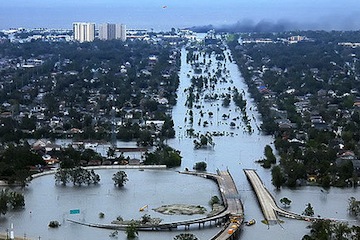How Many People Were Killed by Hurricane Katrina?
Hurricane Katrina was one of the worst natural disasters in the history of the United States. The pictures of loss and devastation immediately burned themselves into the American experience. In spite of this, it proved impossible after the storm to establish how many victims it had claimed. Estimates range from 1,000 to nearly 3,000. Individuals and organizations dedicated to resolving this question started well behind the curve, and never had sufficient resources to execute their objectives.
Estimates at the time of Hurricane Katrina varied widely, and have since concentrated themselves in the 1,000-2,000 range. Many victims were elderly, poor, black, and unable to escape their homes once the city of New Orleans went underwater. Some people went missing when floods swept them away, and their fates can only be imputed from events. Many other bodies were found, but it was not always easy or possible to trace their identities, or to avoid counting the same person twice at different times. Another source of ambiguity was that of deciding who was killed by the storm, and who died due to indirect or unrelated causes.
Several public and private organizations attempted to make an accurate count. Immediate responsibility fell to the Louisiana Department of Health and Hospitals, a public department which relied on help from Kenyon International Emergency Services, a private contractor. At the national level, the National Oceanic and Atmospheric Association has also worked on its own count. At one point, the NOAA reported 1,833 deaths. Now the announced number is 1,100. All organizations involved have admitted a final count will likely be impossible. Complaints about lack of funding have been another issue.
In a world with so many priorities begging for attention, perhaps it was inevitable that the accounting of victims would receive short shrift. Could one argue that funds badly needed for infrastructure, education, mental health, economic investment, and so on would be better used making the count of Hurricane Katrina's toll slightly more accurate? One could say that there should be more money set aside in general for such activity, independent of other programs, but such money has to come from somewhere. In a world of scarce resources and storms which spread their devastation widely, it may sadly be a fact of life that the true costs are forever obscured. It certainly seems like they will be in Katrina's case
Two other storms have caused more fatalities than Katrina in the history of the United States. One is the 1928 hurricane that struck Lake Okechobee in Florida and flooded it over its embankments, killing almost three thousand. The other is the infamous 1900 hurricane which struck Galveston, Texas and completely flooded the island, perhaps killing over 10,000 people. In both of those cases as well, the death tolls we know of today are highly approximate, as the obstacles to accuracy were greatly higher in those times.
Moving forward, some wish to create better standards for the tracking of storm victims. John Mutter of Colombia University is another who attempted to create an accurate count of the storm, and also ran out of funding. Mutter has advocated for clear, consistent standards on how the toll of future storms will be calculated -- something that was missing in 2005. Such standards could help reduce the ambiguity in the accounting of future disasters.
